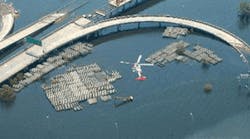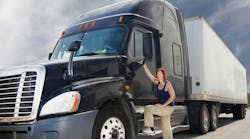A year after Hurricane Katrina devastated southern Louisiana and Mississippi, Associated General Contractors of America (AGC) chief economist Ken Simonson contends the hurricane had a relatively muted impact on the national economy and trucking companies.
“The first impact on GDP was the huge spike in gasoline prices,” Simonson told FleetOwner, noting the 45.6-cent price increase to $3.037 for the week ending Sept. 3, 2005, when Katrina struck. The hurricane also produced a ripple effect as the high oil prices sent other commodities surging—particularly diesel, gasoline, asphalt and petrochemicals.
The Port of New Orleans is the nation’s largest gateway for importing rubber, Simonson pointed out. With port operations crippled in the aftermath of the storm, tire makers in the region were slammed with the double whammy of being cut off from rubber supplies and dealing with sky-high energy costs. Both port operations and nearby manufacturers have since recovered for the most part, Simonson said.
On a national level, the effect of Katrina was mostly seen in high energy prices. Even as gas pumps took a bigger bite out of consumers’ wallets, in the third quarter of 2005, when Hurricanes Katrina and Rita struck, economic growth accelerated to its fastest annualized seasonally adjusted rate for the year—4.2%.
“We dodged the impact from high natural gas prices because the winter was so mild that we didn’t run into shortages after Katrina and Rita,” Simonson said. “Petroleum product prices have remained very high for a variety of reasons for the last six months but that had very little to do with the hurricanes.”
The effect Katrina had on the trucking industry, likewise, was muted. In spite of the obvious need for relief supplies and construction materials in the region, the Gulf Coast disaster did not exert as big a pull on trucking as some expected.
“Trucking demand has been less than anticipated,” Simonson said. “There were expectations there’d be a lot more trailers of equipment and materials moved into the hurricane zone than has panned out. The trucking industry easily satisfied the demand within a few weeks after the hurricane.
“There had been very little on the demand side in that people thought materials and labor costs would be affected nationwide from the large level of rebuilding,” he continued. “While there has been work on infrastructure and on levies, there has been little on the residential level. Even when it kicks in, it won’t register on the radar screen because it’s a small part of the economy.”
It appears that after so many people were displaced by Katrina, people remain hesitant to move back and invest in residential construction for fear of another similar storm.
“It appears people still have a lot of doubts about whether it’s safe to live there,” Simonson said. “There’s plenty of work for contractors but probably not for the jobs people have held. There’s also the financial question of having enough to rebuild.
“I think that there has been permanent displacement of population, considering Baton Rouge is suffering congestion that is likely to last a long time,” he continued. “That’s a localized effect on cross-country traffic. But I don’t think there are major effects on destinations or origins of trucking activities.”
To comment on this article, write to Terrence Nguyen at [email protected]



